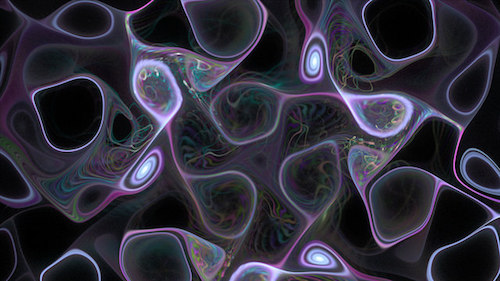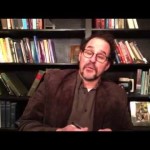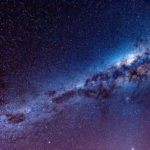We run our website the way we wished the whole internet worked: we provide high quality original content with no ads. We are funded solely by your direct support. Please consider supporting this project.

Can Science Inform Our Theology?
Over the last century, we have witnessed a revolution in various areas of science that relate to how we see the world and even God. For example, the Platonic notion that time and change are less real than timeless stability is being abandoned in light of the fact that physicists work from the assumption that time is real. In the same way, the ancient belief that the world is ultimately composed of individual solid things (atoms) has now been completely abandoned because of the discovery that the physical world is composed of microscopic dynamic events called quantum energy bursts.
Or consider how the previous universally held assumption that science could, in principle, predict everything about the future has given way to the understanding that an element of unpredictability is part of complex systems. In short, the old assumption that the world is a stable, solid, deterministic, thoroughly rational, and utterly predictable system has been replaced by a view of the world as a dynamic process that is to some extent indeterministic and unpredictable.
This shift is not based in arbitrary preferences of scientists. In fact, many have resisted it. The shift has occurred because the evidence has forced it.
And this shift relates to the way we view God. The classical view of God and of creation was thoroughly influenced by, and is logically connected to, the old scientific understanding of reality. While these new developments in science do not prove the open view of the future, it is more consistent with this shift in science. The biblical understanding of divine providence and of the future as partly open and partly settled anticipates everything that is being discovered about dynamic systems in various fields of science today.
For example, quantum theory tells us that we can predict the range of possible behaviors of a given quantum particle before a quantum measurement, but we cannot predict its exact behavior. Similarly, we can statistically predict very accurately how large groups of quantum particles will behave, but not precisely how any one of them in particular will behave.
At the quantum level, the future is partly open and partly settled. The world at every level seems to be constituted as a marvelous dance that exemplifies both form and freedom. There is structure and spontaneity, predictability and unpredictability, everywhere we look.
God’s providential involvement in the world exemplifies this balance. Whatever is necessary to preserve God’s plan for creation is predestined, but within this predestined structure there is room for significant freedom. While this strikes some as paradoxical, it is so only within the context of the now-debunked deterministic worldview. In actuality, God’s ability to move forward in this balance is, in principle, no more paradoxical than our ability to predict, for instance, the ongoing existence of a leaf, despite the uncertainty that exists in all of the quantum particles that make up a leaf. The structure of the leaf defines the parameters within which the quantum particles must spontaneously act. And the structure of creation and of history sets the parameters within which all human freedom must occur.
How beautiful! God is an eternal triune dance of love who eternally displays structure and freedom. His creation, which he invited to join his dance, manifests the same balance of structure and freedom. The freedom within structure that characterizes our lives manifests it. The ebb and flow of human history manifests it. The insect and animal kingdoms manifest it. Weather patterns and all physical processes manifest it. Quantum particles, together with every physical thing that exists manifest it.
If you are interested in this topic, check out Greg’s recently released book The Cosmic Dance here.
—Adapted from God of the Possible, pages 107-11
Photo credit: control9.lcme via Visual Hunt / CC BY-SA
Category: General
Tags: Open Theism, Quantum Physics, Science
Topics: Open Theism
Related Reading

How can you put your trust in a God who’s not in control of everything?
Question: I read your book Is God to Blame? and found it to be very compelling. It’s rocking my world. But I’m also finding I’m now having trouble trusting God like I used to. I used to believe that God ordained or at least foreknew all that was going to happen. Now I’m questioning this, and I’m wondering…

What is the significance of Psalm 106:23?
“Therefore he said he would destroy them— had not Moses, his chosen one, stood in the breach before him, to turn away his wrath from destroying them.” Moses (on several occasions, we have seen) persuaded God to change his mind regarding his plan to judge Israel. This inspired verse explicitly says that God “would destroy…

Isn’t God “changing his mind” an anthropomorphism?
Question: Traditionalists argue that passages that refer to God “changing his mind” are anthropomorphic, depicting God in human terms. Open Theists take these passages literally, however. But if you’re going to take these passages literally, it seems you should, for consistency’s sake, also interpret passages about God “coming down” from heaven literally (e.g. Gen. 11:5;…

Free Will: What about “natural” evil? Was Hurricane Sandy a Free Agent?
What about natural evil? How does free will help to make sense of this? Greg reflects on the origins of sickness, natural disaster, animal suffering and so on. Hope you’re enjoying the series so far. There’s more to come!

What is the significance of Ezekiel 33:13–15?
“[W]hen I say to the righteous he will surely live, and he so trusts in his righteousness that he commits iniquity, none of his righteous deeds will be remembered…he will die. But when I say to the wicked, ‘You shall surely die,’ and he turns from his sin and practices justice and righteousness, if a…

Love and Quasars: The Paul Wallace Interview (podcast)
Dan Kent talks with Paul Wallace about his new book: “Love and Quasars: An Astrophysicist Reconciles Faith and Science.” Episode 593 http://traffic.libsyn.com/askgregboyd/Episode_0593.mp3
